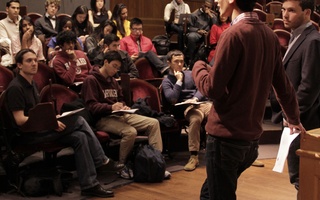Yesterday, more than 100 Harvard faculty members signed an open letter calling for Harvard University to divest from fossil fuel industries. Citing ethical, health-based, and financial concerns, the letter was the first major statement by University faculty in opposition to President Drew G. Faust’s stance against divestment, which she has reiterated several times since her October statement to the Harvard Community.
The letter reminds us that Harvard has an important role in discussions about climate change. We are part of a University that both contributes to public understanding about climate issues and works to find sustainable solutions. This is a fruitful area for discussion inside and outside Harvard Yard, and the open letter from the faculty is a welcome, engaging addition to the dialogue on campus.
Despite the letter’s reasoned arguments, we continue to oppose divesting the University endowment from the fossil fuel industry. As we opined last fall, while we understand the urgent necessity of environmental activism and awareness, Harvard would be better served by addressing these concerns in ways other than divestment.
Unlike the case of the tobacco industry, from which Harvard divested in the 1990s, the University will continue to utilize fossil fuels for its everyday functions, as will the rest of the world for the foreseeable future. Fighting climate change rests not on rejecting fossil fuel companies today, but rather on contributing to the development of new technologies and resources for tomorrow.
Activism, by both students and faculty, is an integral tradition and a vital outlet for student opinions and goals. However, movements must be responsible not only for their messages, but also for their tactics. Last month, student members of Divest Harvard uploaded a cleverly edited video of an interaction with President Faust in Harvard Yard that did not accurately show Faust’s complete opinion. Gimmicks aimed at demonizing opposition views do not move the conversation forward. Reasoned arguments—like those articulated in the open letter—do.
Furthermore, the University has taken steps forward with the recent adoption of responsible investment standards. This week, President Faust announced the commencement of new initiatives, including adherence to United Nations-supported Principles for Responsible Investment. This will allow careful analysis of investments and strategies without total industry divestment. The open letter probed Harvard’s commitment to influencing its investments as a shareholder, and there is certainly room, short of divestment, for the University to use its leverage for positive ends.
We applaud that faculty members have expressed their opinions in this important conversation. We need to continue to discuss these issues in a responsible manner. The Harvard administration should not take its faculty’s concerns lightly. Encouragingly, President Faust’s commitment to responsible investment standards is an indication that it doesn’t.
Read more in Opinion
Ban the Bossy Ban BossyRecommended Articles
-
HKS Students Vote in Favor of Responsible InvestmentStudents at the Harvard Kennedy School became Harvard’s second student body to vote yes on a referendum question supporting responsible investment of the University’s endowment.
-
Harvard, Be a Responsible Owner!Our commitment to transparency, fairness, sustainability, and human dignity should not end at Harvard’s gates. Harvard must be a responsible owner of all its investments, particularly of the companies in which it owns a controlling stake
-
Unethical EndowmentHarvard needs to seriously investigate and address the allegations raised in Responsible Investment’s report, and needs to do so in a transparent and public way.
-
 Group Protests Alleged Environmental Damage
Group Protests Alleged Environmental Damage -
 Responsible Investment Asks For UC Support
Responsible Investment Asks For UC Support -
 Students Rally Against Harvard's Management of Timber Plantations in Argentina
Students Rally Against Harvard's Management of Timber Plantations in Argentina













